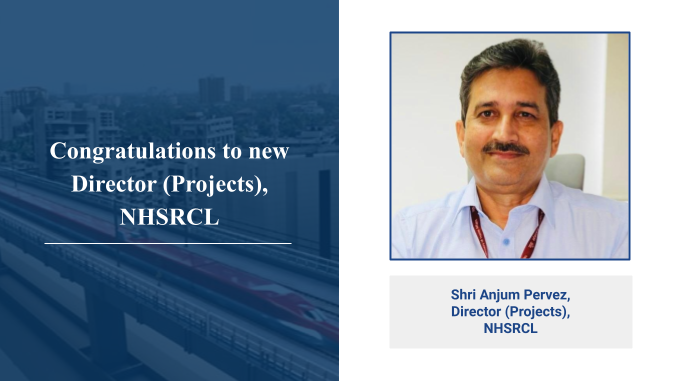
He joined the National High-Speed Rail Corporation immediately after its inception on 6th Dec 2016 and was one of the three officers with whom the organisation started. Before assuming charge as Director/Project, he was Principal Executive Director (Planning & Development) at NHSRCL.
More Details:
- He has played an instrumental role in the finalisation of the Manual of Standard & Specification (MSS) for Bridges & Viaducts, Track, Stations, Tunnels, Earthwork, etc. for India’s first high-speed rail.
- Till now he was leading the team responsible for the completion of ground survey viz, LIDAR, Geotechnical, Hydrological, Static Refraction Test, ERT etc. required for the design of MAHSR alignment (both vertical & horizontal), Viaduct, Bridges, Tunnels (both undersea and mountain), Environmental Impact Assessment (EIA) and Resettlement Action Plan (RAP) and Finalization of Land Plan & Land acquisition.
- While working as Director (Works) and Executive Director (Project Monitoring) in the Railway Board, Ministry of Railways, Shri Pervez was responsible for monitoring the progress, allocation of funds, grant of technical approvals, etc. of over 300 Major railway projects such as new Lines, doubling, gauge conversions costing around 40 Billion USD.
- Shri Anjum pervez has vast and rich experience in various capacities in Indian Railways and was responsible for the maintenance & and modernization of Railway Tracks, planning, execution, and commission of new railway projects.
About NHSRCL:
- National High-Speed Rail Corporation Limited (NHSRCL) was incorporated on 12th February 2016 under the Companies Act, 2013 with an objective to finance, construct, maintain and manage the High Speed Rail Corridor in India.
- The Company has been modelled as a ‘Special Purpose Vehicle’ in the joint sector with equity participation by the Central Government through Ministry of Railways and two State Governments viz. Government of Gujarat and Government of Maharashtra.
- The High-Speed Rail (HSR) project, apart from being a technological marvel, would afford many quantifiable benefits like saving in travel time, vehicle operation cost, reduction in pollution, job creation, reduction in accidents/ enhanced safety, imported fuel substitution, and reduction in pollutants.
- The project would also boost the infrastructure and add to the growth of the economy. HSR would be an integrated system having overall optimization of various components, viz. Hardware, Software, Human-ware, and their interface, etc.
- The Company would require a manpower strength of about 3000 – 4000 officials (estimated) for executing the operations of the high-speed corridor. The requisite manpower would need to be highly proficient in implementation of high-speed technology so as to execute the project efficiently and effectively. Therefore, the Company has started construction of an exclusive training institute at Vadodara to cater to this aspect.
- The Company would be ushering India into the category of few countries of the world (about 15) using High Speed Railway System.
Source: NHSRCL | Image Credit: NHSRCL

